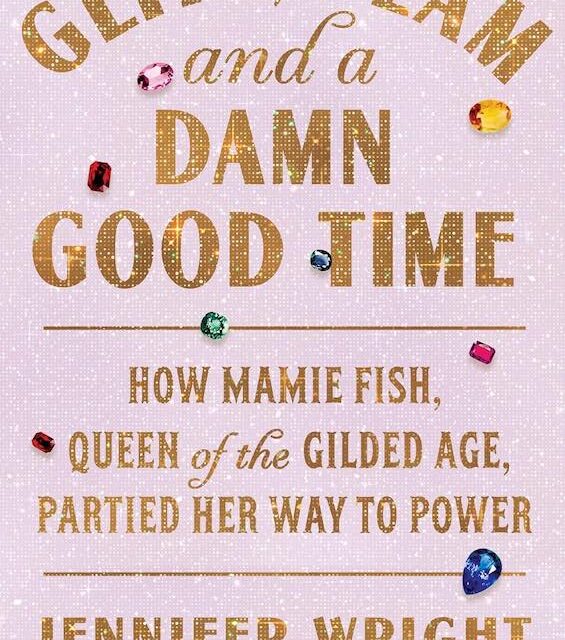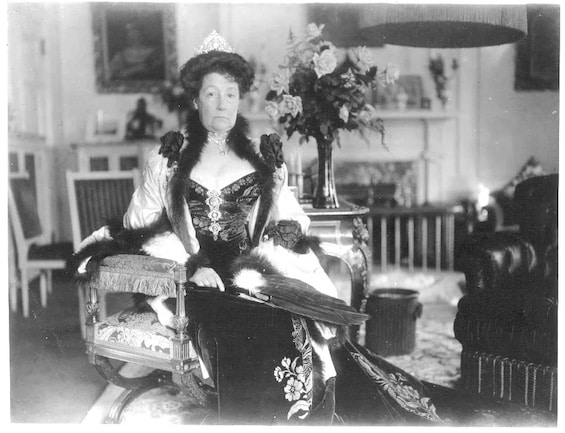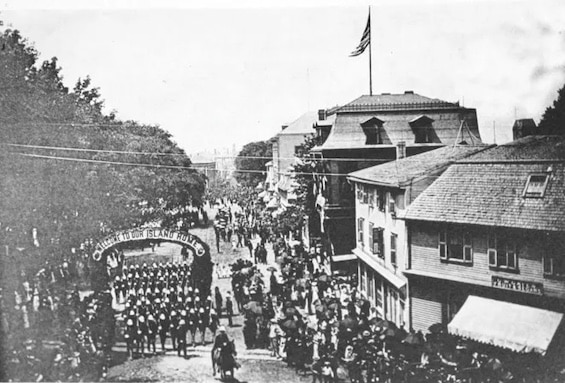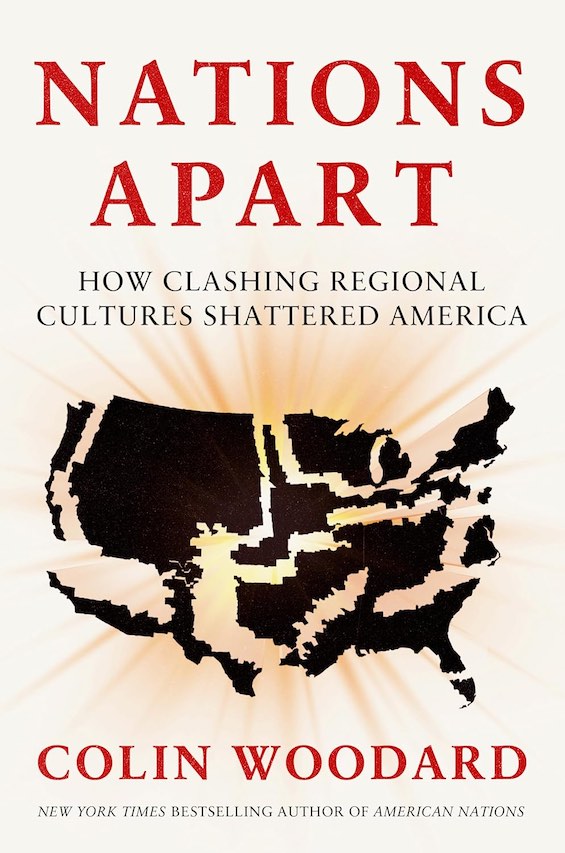Mark Twain satirized the period as the Gilded Age, suggesting that an overlay of gold plating hid the seamy reality underneath. Later, historians fixed the term to the years from the late 1870s to the late 1890s. Then, America emerged from the devastation of the Civil War to become the world’s preeminent industrial power. And a few prominent men held most of the great wealth generated by this growth. They possessed private fortunes surpassed only by today’s high tech billionaires. Meanwhile, their wives, circumscribed by the sexist conventions of the Victorian era, rarely played any role in the economy. Instead, they held their own competitions for power and acclaim by building grand houses and holding parties. Journalist Jennifer Wright tells the story of one of the most acclaimed of these women in Glitz, Glam, and a Damn Good Time. It’s a biography of the Gilded Age itself.
Prominence based on genealogy and wealth
Wright’s subject is Marion Graves Anthon Fish (1853-1915), known to her friends as Mamie Fish or Mrs. Stuyvesant Fish. The Fish family (who called themselves “the Fish”) did not possess great wealth. Their prominence rested on their genealogies. The Fish traced their ancestry back to the Dutch colony that preceded English settlement in New York. Mamie’s husband, Stuyvesant Fish (1851-1923), was the son of Hamilton Fish (1808-93), formerly Secretary of State, President Ulysses Grant’s most trusted advisor, and in turn the son of Alexander Hamilton’s best friend.
However, the Fish were far from poor. Later in life, Mamie claimed that the family’s fortune never exceeded $3 million. In 1890 dollars, that was the equivalent of just over $100 million today. But the context suggests that Mamie was low-balling the claim. Even so, the family’s net worth paled beside the wealth of such men as Andrew Carnegie and John D. Rockefeller. But Mamie didn’t need hundreds of millions to “party her way to power,” as Wright suggests.
Glitz, Glam, and a Damn Good Time: How Mamie Fish, the Queen of the Gilded Age, Partied Her Way to Power by Jennifer Wright (2025) 235 pages ★★★★☆
Chatty style with lots of exclamation marks
I don’t read gossip columns or celebrity stories in women’s magazines. But I imagine that readers of such things will find Jennifer Wright’s style in Glitz, Glam, and a Damn Good Time to be familiar. It’s casual, often chatty, and features liberal use of exclamation marks.
Wright prefaces Mamie’s story with a brief history of party-giving. This approach makes for an eminently readable story. But if you’re looking for a feminist angle on the Gilded Age, which was filled with consequential developments in America’s economic and political history and marked advances for women, you won’t find it here. This is Mamie Fish’s story. It’s about parties. The palatial homes where they were held. What people wore. What they ate. And what they thought about Mamie and Mrs. Astor and Ward McAllister and the other movers and shakers in Mamie’s social circle.
In fairness, Wright pays lip service from time to time to the contrast between the ostentatious (and obnoxious) display of wealth by the uber-rich and the abject poverty of millions of workers. She freely acknowledges the desperation of so many Americans in thrall to the winner-take-all economics of the Gilded Age. And she rightly pays special attention in these brief digressions into the suffering of the young women who powered so many of the wealth-generating factories owned by her subjects. But it’s not enough. Not nearly enough.
A kinder review of this book by artificial intelligence
Most reviewers of Glitz, Glam, and a Damn Good Time were kinder than I was. That’s reflected in the following review by Claude-AI Sonnet 4, because it’s based on those other reviews as well as any available online summaries of the book. With the exception of one subhead I’ve inserted to break up the text, what follows is word-for-word what the AI wrote.
A Sparkling Biography of the Gilded Age’s Ultimate Hostess
Jennifer Wright’s “Glitz, Glam, and a Damn Good Time: How Mamie Fish, Queen of the Gilded Age, Partied Her Way to Power” is a delightfully entertaining dive into the life of one of America’s most fascinating forgotten figures. Marion Graves Anthon Fish, known as “Mamie” and “The Fun-Maker,” threw the most epic parties in American history, and Wright brings her extraordinary story to vivid life.
Wright, acclaimed author of “Madame Restell” and “Get Well Soon,” demonstrates her signature ability to transform historical research into compulsively readable narrative. Rather than presenting Mamie Fish as merely a frivolous society hostess, Wright reveals how this remarkable woman wielded social gatherings as tools of influence and power during the Gilded Age. The book brilliantly illustrates how parties became political statements and how entertainment served as a form of female empowerment in an era when women had few other avenues to authority.
Witty, accessible prose
What makes this biography particularly engaging is Wright’s witty, accessible prose that captures both the absurdity and the strategic brilliance of Fish’s approach to society. The author doesn’t shy away from the contradictions of the era—the extreme wealth alongside social inequality, the liberation and limitations faced by even privileged women. Through meticulous research, Wright paints a complex portrait of a woman who understood that in a world where she couldn’t vote or hold office, she could still shape society through her drawing room.
The book succeeds as both historical scholarship and pure entertainment. Wright’s narrative sparkles with the same energy that must have animated Fish’s legendary gatherings, making readers feel as though they’re receiving coveted invitations to the most exclusive parties of the 1890s. This is social history at its most engaging—serious enough to illuminate important themes about gender, power, and American society, yet light enough to be thoroughly enjoyable. Wright has crafted a biography that would make Mamie Fish herself proud: substantive, surprising, and undeniably fun.
About the author
Jennifer Wright, the political editor-at-large of Harper’s Bazaar. has written seven nonfiction books over the past decade. Born in 1986, she is a graduate of St. John’s College in Annapolis, Maryland. She is married and lives with her husband in New York.
For related reading
For additional insight into the Gilded Age, see:
- The Tycoons: How Andrew Carnegie, John D. Rockefeller, Jay Gould, and J. P. Morgan Invented the American Supereconomy by Charles R. Morris (The Robber Barons who dominated the Gilded Age)
- The Murder of the Century: The Gilded Age Crime That Scandalized a City & Sparked the Tabloid Wars by Paul Collins (The Gilded Age murder that set off the tabloid wars)
- The Edge of Anarchy: The Railroad Barons, the Gilded Age, and the Greatest Labor Uprising in America by Jack Kelly (The American labor movement in the Gilded Age)
You’ll find other sources of related information at:
- 12 great biographies
- Top 20 popular books for understanding American history
- 25 top nonfiction books about history
And you can always find the most popular of my 2,300 reviews, and the most recent ones, on the Home Page.

































